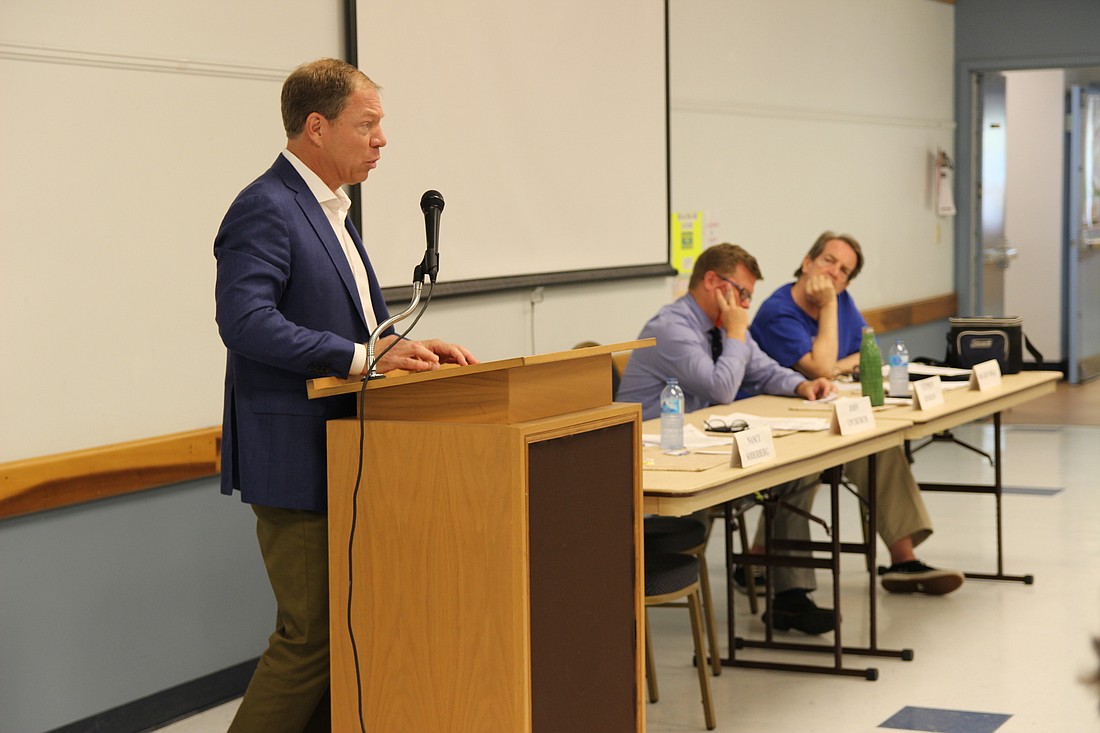- April 18, 2024
-
-
Loading

Loading

Two of the three current democratic candidates for Florida's 6th Congressional District detailed their health care reform plans if elected in the general election this coming November, and how to make health care more affordable, during a debate sponsored by the Florida Sixth District Healthcare Action Group at the Ormond Beach Library on Saturday, May 26.
Congressional candidates Stephen Sevigny and John Upchurch answered questions from the moderators and audience members regarding their respective platforms on health care. Sevigny, an Ormond Beach resident who is both a radiologist and the medical director of the Twin Lakes Imaging Center, said health care is the primary reason he's running for Congress. He said his two core beliefs are that health care is a human right and that health care costs are "bankrupting" the U.S.
Upchurch, an Ormond Beach resident and business owner who operates Odyssey Travel, said he believes the country needs to make sure money goes to high-quality health care. He said the three reasons why it's so expensive are for-profit hospitals, big pharmaceutical companies and the American Medical Association.
Congressional Candidate Nancy Soderberg was not able to attend the debate due to illness, but her campaign field manager issued a statement outlining her platform, which included increasing access to affordable health care, lowering premiums and prescription drug costs and improving access to mental health care.
These are some of the questions the candidates answered during the debate.
Upchurch said he would advocate for expanding Medicare because it would be a way for everyone to benefit from medical services and put business on a "level playing field." He said this would help prevent individuals struggling with medical bills from worrying about other financial problems that arise as a result of illness, such as losing their house to foreclosure.
“Medicare for all would immediately reduce the amount of money that’s paid to insurance companies," Upchurch said. "Medicare works. It is the most efficient delivery of medical services that we have in our country.”
Sevigny said there were five basic things that affect health care costs: hospitals, big pharmaceutical companies, insurance companies, medical plans and physicians. One of the ways to reduce costs, he said, is to stop pharmaceutical companies from regulating the price of prescriptions.
“We’re the only industrialized country where the pharmaceutical companies tell us what we’re going to pay for medicines," Sevigny said.
Seeing as the U.S. spends the most per person on health care, Sevigny said the money is available, but it needs to be directed correctly. He said it should be going into caring for patients instead of Wall Street or big pharmaceutical companies.
“No one is squeezing that at all," Sevigny said. "We’re funding those profit streams.”
Upchurch said cost reduction is the first choice, and following that would be to simply allocate more funding from the general budget. He added that he believes in increasing preventative care, such as raising awareness for better diet, exercise and alternative forms of medicine. He said there is also a need to expand county health clinics and increase nurse-to-patient ratios, which will reduce costs.
“At the end of the day, that’s what we’re looking for in health care, is better patient outcomes and trying to reduce our cost," Upchurch said.
Adequate funding, answered Sevigny. Other than that, he said he didn't know what else to add.
Upchurch said that along with that, there has to be a follow-up after they've completed treatment. He mentioned the high costs of mentally ill individuals being housed in state prisons after committing serious crimes and advocated for funding for preventative programs.
“Mental illness is blind," Upchurch said. "It knows no color, so it can impact anybody and anybody’s head.”
Upchurch said big pharmacies need to be held accountable for the problem they created, stating that opioids weren't addictive. He said he had Volusia County Sheriff Mike Chitwood's endorsement on this issue and talked about the need to support Stewart-Marchman-Act Behavioral Healthcare with funding.
While some individuals need opioids for certain illnesses, Upchurch said they need to make sure they're not prescribing it to "everybody."
“When my son goes and has his wisdom teeth taken out, they give a bunch of Oxycodone as opposed to when I got that done, they gave you two Tylenol and said: ‘OK, hope you feel better in the morning,'" Upchurch said. "That is a problem. That’s where our addiction starts.”
In contrast, Sevigny said the prescription problem is almost solved. Pharmaceutical companies have also started making pills that are unable to be crushed into dust for consumption, Sevigny said, turning into a gel paste instead.
He said the answer lies within programs like Stewart-Marchman-Act's treatment centers and that the capped number for beds in those centers needs to be lifted.
“Reward programs that work," Sevigny said.